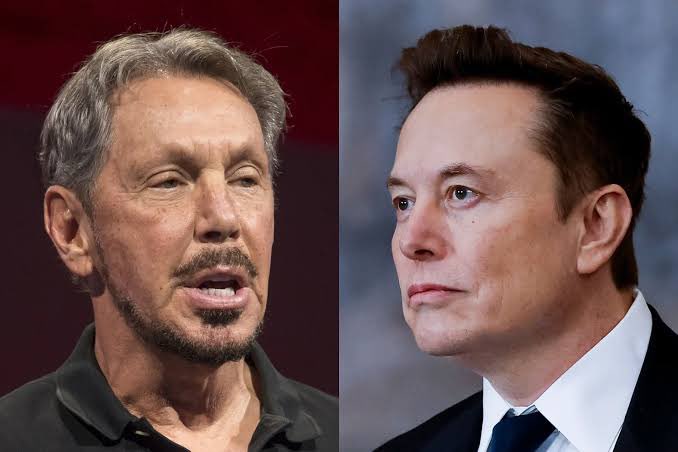
Larry Ellison’s $70 Billion Surge Puts Elon Musk’s Title as World’s Richest Man on the Line

The global billionaire rankings have been thrown into turmoil once again as Oracle co-founder Larry Ellison stunned the financial world by adding an eye-popping $70 billion to his fortune in a single day, setting him on a collision course with Tesla boss Elon Musk for the title of the world’s richest man. The extraordinary surge, which analysts describe as one of the largest one-day wealth gains in modern financial history, has cast a new spotlight on the shifting power dynamics among the ultra-wealthy, who are no strangers to dramatic swings in their fortunes. Ellison’s staggering windfall came as Oracle shares skyrocketed following a blockbuster earnings report that exceeded Wall Street’s expectations and reinforced the company’s growing dominance in cloud computing and artificial intelligence infrastructure. The 80-year-old billionaire, long celebrated for his sharp business instincts and enduring influence in Silicon Valley, now finds himself at the center of a global financial conversation, as the Oracle rally has given him the momentum to potentially dethrone Musk, who has clung to the top spot despite his own volatile wealth swings tied to Tesla’s rollercoaster stock price.
For years, Musk has epitomized the archetype of the unpredictable billionaire whose net worth fluctuates wildly in tandem with the value of his electric car company and his ambitious ventures like SpaceX and X, the platform formerly known as Twitter. While Musk has seen breathtaking gains in the past, he has also suffered equally steep losses, often shedding tens of billions in a matter of days when Tesla stock takes a beating or when investors grow uneasy about his unorthodox management style. Ellison, by contrast, has cultivated a reputation as a strategic operator whose wealth, while immense, has grown at a steadier pace, tied to Oracle’s evolution from a traditional database software company into a modern force competing with the likes of Amazon Web Services and Microsoft Azure in the cloud space. The suddenness of Ellison’s rise this week, however, has defied expectations, as Oracle’s stock soared on massive demand for its AI-driven solutions and growing partnerships with tech giants that are racing to capture market share in the artificial intelligence boom.
The scale of Ellison’s one-day windfall—$70 billion—is almost unimaginable in human terms, equivalent to the annual GDP of entire countries and larger than the market capitalization of some Fortune 500 companies. To put it into perspective, that single-day gain eclipses the lifetime fortunes of many self-made billionaires, underscoring just how concentrated wealth has become in the hands of a small circle of tech titans. Financial commentators were quick to note that such astronomical jumps are not merely about luck but about being positioned at the right place in the rapidly shifting technological landscape. Oracle’s embrace of artificial intelligence, bolstered by its infrastructure capabilities and long-standing relationships with corporate clients, has allowed Ellison to ride the wave of investor enthusiasm that has lifted the entire AI sector over the past year.
Musk, who has watched his net worth soar past the $200 billion mark multiple times in recent years, now faces the real possibility of being overtaken by Ellison, whose fortune has traditionally trailed behind fellow tech moguls like Bill Gates, Jeff Bezos, and Warren Buffett. According to real-time billionaire trackers, Ellison’s net worth after the latest surge has vaulted him to within striking distance of Musk’s position at the top, narrowing a gap that once seemed unthinkably wide. The contest between the two men is emblematic of broader shifts in the tech industry itself, as the narrative moves from electric vehicles and space exploration to cloud computing and artificial intelligence as the new frontier of wealth creation. Musk, for all his daring bets, has seen Tesla’s valuation come under scrutiny amid concerns about competition from Chinese EV makers, slowing demand in some markets, and his polarizing behavior on social media. Ellison, meanwhile, has quietly steered Oracle into a position of renewed relevance, with investors rewarding his long-term vision in spectacular fashion.
What makes Ellison’s rise particularly intriguing is his personal connection to Musk. The two men are not rivals in the traditional sense; Ellison has long been a friend and supporter of Musk, even serving on Tesla’s board of directors. In fact, Ellison once revealed that he had personally invested in Tesla stock, calling Musk “a very close friend” and one of the most brilliant entrepreneurs of the era. Now, however, the same market forces that once linked their fortunes have placed them on opposing sides of a symbolic race for the crown of global wealth. Observers note that while Musk may not view Ellison as a rival in business, the optics of losing his spot to the Oracle founder could sting, particularly given Musk’s public persona as a larger-than-life figure who relishes being at the top of the world’s wealth rankings.
The ripple effects of Ellison’s gain are already being felt across global markets and among the billionaire class, where competition for the top positions carries not just bragging rights but also symbolic power in shaping narratives about innovation, influence, and the future of technology. Jeff Bezos, who once reigned supreme as the world’s richest man thanks to Amazon’s meteoric rise, has also seen his position fluctuate in recent years, and now finds himself pushed further down the rankings as Ellison vaults upward. Bill Gates, who held the top spot for much of the late 20th and early 21st century, has long since stepped back from the race, dedicating much of his wealth to philanthropy, while Ellison has remained firmly entrenched in the business world, continuing to oversee Oracle’s direction and strategy even as he enjoys a luxurious lifestyle on his private island in Hawaii.
Critics of the billionaire wealth rankings often point out that such dramatic swings highlight the fragility and artificiality of these fortunes, which are tied not to liquid assets but to fluctuating stock prices that can rise or fall on the whims of the market. Indeed, Ellison’s $70 billion gain, while jaw-dropping, could just as easily be erased in the coming weeks if Oracle’s stock cools or if investors reassess their optimism. Musk himself is a living example of how quickly fortunes can change, having lost more than $100 billion in a single year during one of Tesla’s downturns. Yet for the moment, Ellison’s surge represents a remarkable milestone in the ongoing saga of wealth accumulation at the highest levels of capitalism, where billions can be created or destroyed in the span of a trading day.
As the markets prepare for their next move, all eyes will remain on the two titans—Musk, the unpredictable visionary chasing Mars and redefining transportation, and Ellison, the seasoned strategist who has bet big on the power of artificial intelligence to reshape industries. The coming weeks may determine whether Ellison’s rise was a fleeting anomaly or the beginning of a new era in which Oracle, long considered a legacy software company, becomes the crown jewel of the AI age. For Musk, the prospect of losing his title may be little more than a symbolic setback, yet in a world obsessed with wealth rankings, symbols matter. For Ellison, the sudden proximity to the top of the list is a testament not only to his enduring relevance in the tech world but also to the extraordinary, almost surreal nature of wealth in the 21st century, where one day can rewrite the global pecking order of billionaires.


